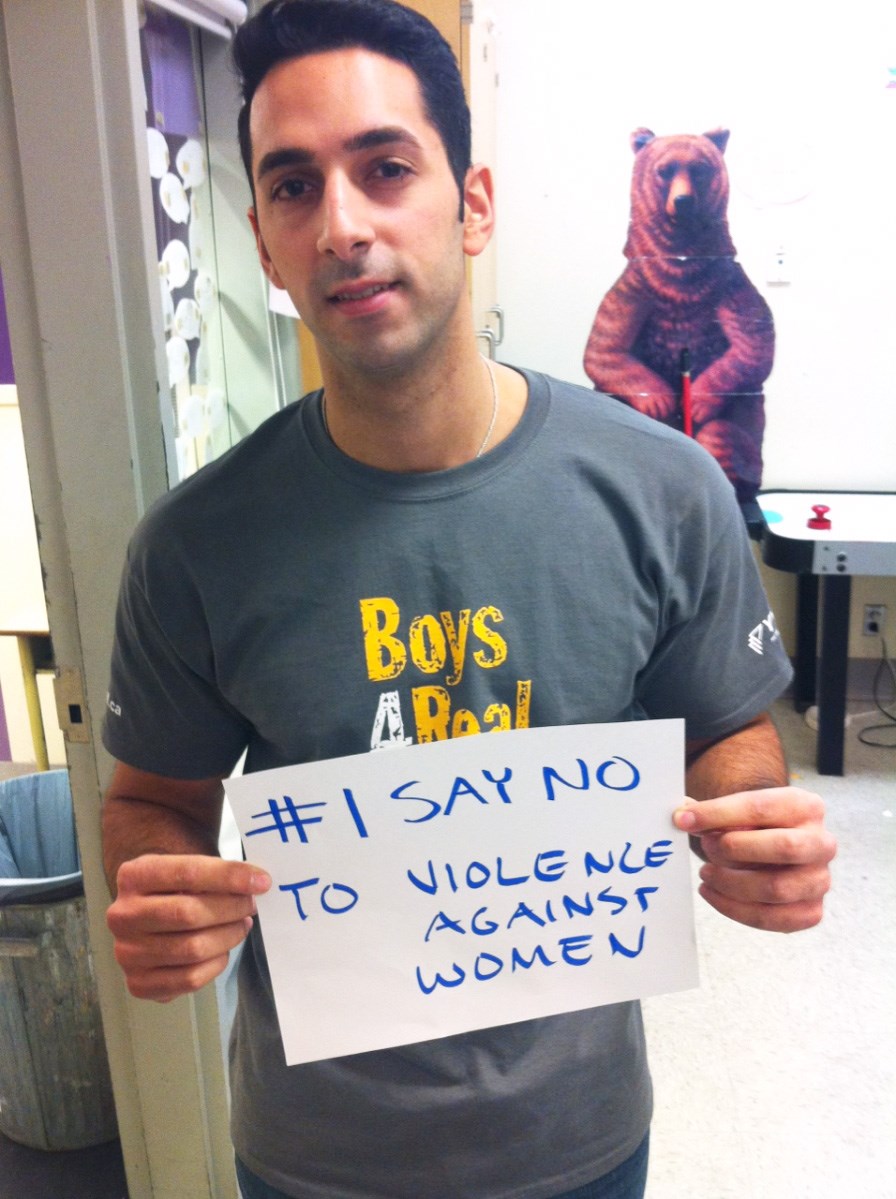Kash Arianpour wants to have a conversation with boys about girls.
A volunteer facilitator for the YWCA of Metro Vancouver’s Boys4Real after-school program, Arianpour and another facilitator of a group for Grade 7 boys at Dickens elementary school performed a skit this fall where a girl was being harassed in a high school hallway. In the sketch, boys rated girls on their appearance, saying “ridiculous things,” according to Arianpour.
The boys laughed at the skit and justified their laughter afterward. But when the facilitators turned the conversation around and asked how the boys would feel if the female being harassed was their sister or mother, they viewed the incident with fresh eyes, Arianpour said. Maybe such incidents do devalue girls and women.
“That was a 20-minute conversation, but I know somewhere down the road they’re going to look back and that’s going to somehow affect them,” said 24-year-old Arianpour.
Landmarks across Canada will “Light the Night,” Dec. 4 to 6 to show solidarity and support for the National Day of Remembrance and Action on Violence Against Women. Science World and B.C. Place will glow red.
The YWCA is hoping men and boys in Metro Vancouver will take a stand on violence against women by taking the #ISayNoTo pledge at ywcavan.org and sharing a photo of themselves with an #ISayNoTo message on Facebook or Twitter.
Arianpour was the first man to take the pledge after Mayor Gregor Robertson, Courier columnist Free Lee, Vancouver Police Chief Jim Chu, president of the YMCA of Greater Vancouver Steve Butz and Mike McNight, CEO of the United Way of the Lower Mainland.
Arianpour hopes his participation in the campaign will influence the 12- and 13-year-olds he leads.
Arianpour, a UBC graduate headed for medical school, became committed to preventing violence against women after he volunteered with the Beauty Night Society at a women’s shelter in the Downtown Eastside for three years.
“Just seeing the women at the women’s centre and the fact that many of them, the majority of them, are there not there because of drugs, not because of more typical things that people think of. But most of it goes back to abuse, whether it’s childhood abuse from their family or whether it’s a young relationship with an older boyfriend,” he said.
Men need to put a face to their stance against violence against women because its incidence reflects societal values, says Lisa Rupert, director of violence prevention and housing for the YWCA. She said women can participate in the #ISayNoTo campaign, too.
“Right now, we have a society where women don’t have an equal role. It’s a culture where it’s OK for women to be paid less, where women are expected to take on more responsibilities for childcare, for housework, where it’s OK for women to be harassed in the street, threatened with assault and rape on the Internet. Last year there were 16,000 women and children living in transition houses in B.C. alone, and 11 women were murdered by their intimate partners,” Rupert said. “It’s going to take the whole community — men, women, boys and girls to change our culture and for us to heal and so this is an opportunity for men to speak out, state what they believe and show others this is the community we want.”
Rupert hopes the campaign with inspire everyone to reexamine their own values and behaviour.
“It’s the first step in getting people to change,” she said.
“And the other thing I hope, people who’ve experienced violence and abuse, they often feel that they’re not cared about, they’re not believed. They even feel isolated from the rest of the community,” Rupert added. “When they see people speaking out against what happened to them, they feel validated, they feel cared about, they feel connected with the larger community. That’s really valuable, too.”
The YWCA says violence against women is a broad-based problem that requires a systemic response. Rupert says individuals can speak out.
“We can say to our friend, our relative, our neighbour who we see behaving in oppressive ways, ‘Hey, I noticed this, and I’m not OK with it,’” she said.
Rupert says it’s not about shaming anyone.
“We can say, ‘I’m wondering if you need some support around this because it’s not OK and someone’s being hurt.’”
Rupert says governments could help a parent in an abusive relationship leave by ensuring access to universal childcare and affordable housing.
She noted some European governments pay child support to the parent who cares for the children so that this income is reliable. (The government collects the payments from the other parent.)
“It’s one way of reducing poverty and making sure that women are able to leave their abuser, that they’re not financially dependent on them,” she said. “That’s one of the biggest reasons women go back.”
The responses she’s seen to the allegations of abuse levelled against CBC Radio host Jian Ghomeshi and actor and comedian Bill Cosby have heartened her.
“It feels like a moment where we could create real momentum for change,” Rupert said.
Twenty-five years ago this Saturday Marc Lepine murdered 14 female engineering students at a school in Montreal while screaming, “I hate feminists!”
“It still remains one of the most overt acts of violence against women in Canadian history,” Rupert said.
She doesn’t believe Canadian society has progressed far since then.
“I’m looking forward to the day when we look back on that day and say, wow, what a different world we’ve created.”
twitter.com/Cheryl_Rossi



